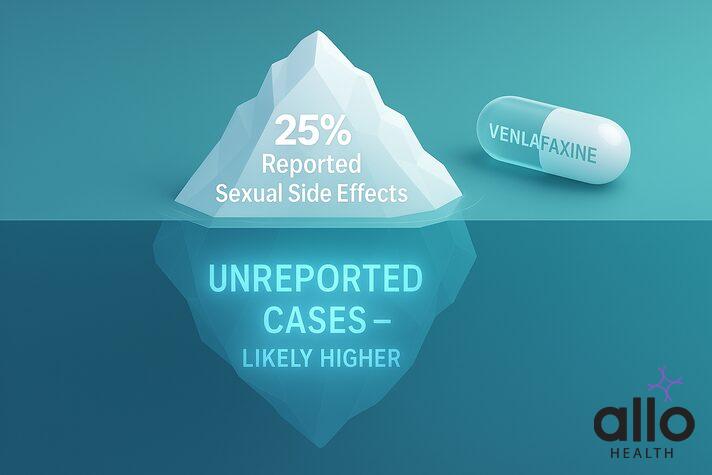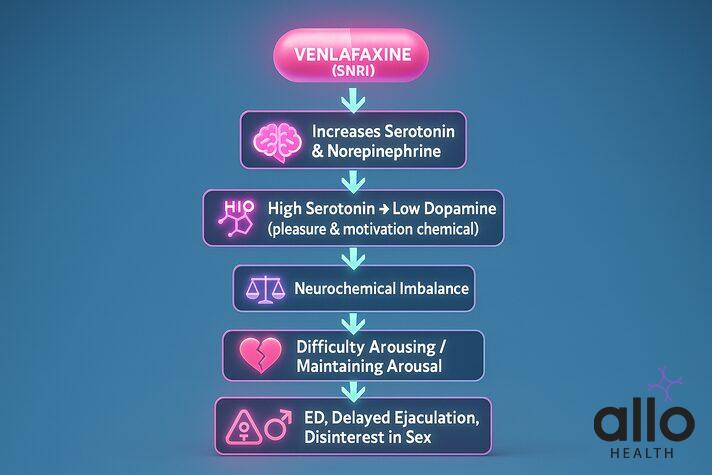Venlafaxine (Effexor) and Erectile Dysfunction: Managing Side Effects
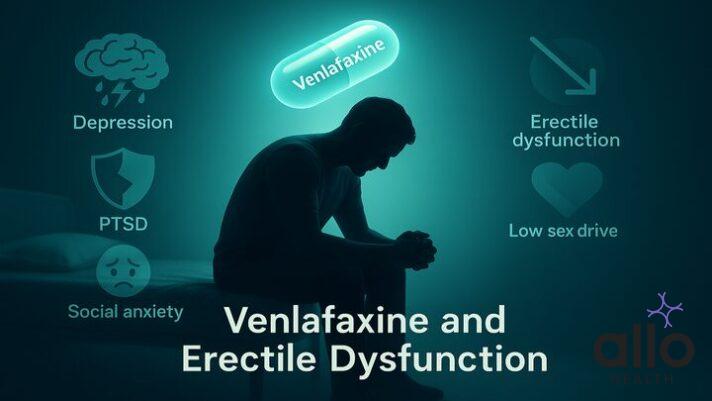
Venlafaxine (Effexor) is an antidepressant that can cause erectile dysfunction in men. It can also cause other sexual side effects, like decreased sex drive, in both men and women. About 1 in 4 people may notice this. It happens because the medicine raises serotonin (the brain chemical responsible for mood), which can lower dopamine, the “desire and arousal” chemical. For many, this improves after a few weeks, but for some, it can last longer. The good news is, it’s manageable. Doctors can adjust the dose, switch to another medicine, or add supportive treatment like Viagra, to treat erectile dysfunction.. Most importantly, don’t stop taking venlafaxine and always talk to your doctor openly about the side effects. With the right plan, you can find the balance to take care of both your mental health and sexual wellbeing.
Venlafaxine is a commonly prescribed antidepressant drug. It is commonly sold under the brand name Effexor. It is used to treat depression and anxiety. But it can come with sexual adverse effects, like erectile dysfunction. It’s important to understand how venlafaxine and sex drive are related to help manage side effects.
This article will guide you through the facts and medication management of these side effects.
Does Venlafaxine Cause Sexual Side Effects in Men?
Yes, venlafaxine (effexor) can cause sexual problems like erectile dysfunction. It can also cause low sex drive and trouble ejaculating. But these issues may also come from the health conditions it treats. Determining whether the cause is the drug response or the illness is key to managing and treating the symptoms.
How Common Are These Sexual Side Effects?
About 25% of people [1] taking venlafaxine report sexual side effects. The true number might be higher, as not everyone talks about these symptoms with their doctor. Doctors need to see if the problem is caused by venlafaxine itself or by the condition it’s meant to treat. Mental health conditions like depression (major depressive disorder), stress from past trauma (posttraumatic stress disorder), or fear of social situations (social anxiety disorder) can cause sexual dysfunction. Other mental health reasons can also play a role. Finding the cause is the first step to fixing it.
Many users across online forums [2] have reported side effects caused by the drug.
Why Does Venlafaxine Cause Sexual Side Effects?
Venlafaxine increases natural chemicals in the brain, like serotonin and norepinephrine. Serotonin helps to regulate mood and sleep, and Norepinephrine helps to increase energy and manage stress.
This flowchart explains how serotonin-based drugs (serotonergic drugs) like venlafaxine affect sex drive:
Venlafaxine (Class of antidepressant: SNRI i .e, serotonin-norepinephrine reuptake inhibitor)
⬇️
Increases Serotonin and Norepinephrine in the brain
⬇️
High Level Of Serotonin Reduces Dopamine Release (Dopamine: a chemical in the brain responsible for pleasure and sexual motivation.)
⬇️
Creates Neurochemical Imbalance (low dopamine, high serotonin)
⬇️
Reduced Sex Drive (decreased libido impairs normal sexual function)
⬇️
Difficulty Becoming/ Staying Aroused
⬇️
Erectile Dysfunction, Delayed Ejaculation, Disinterest in Sexual Activities
Other drugs that can cause similar side effects are:
- Selective serotonin reuptake inhibitors(SSRIs): Citalopram.
- Tricyclic antidepressants (TCAs): Clomipramine.
- Monoamine oxidase inhibitors( MOAIs): Phenelzine.
Are These Sexual Side Effects Permanent?
Sexual side effects caused by Venlafaxine may sometimes go away on their own as your body adjusts to the drug. [3]
Higher doses of venlafaxine may increase the risk of sexual issues. Sometimes, the side effects may persist for the entire duration of the treatment. [4]
In rare cases, the effects may last even after withdrawal [5] or switching to another drug.
Does Venlafaxine Cause Sexual Side Effects In Women?
Women taking venlafaxine can also experience sexual dysfunction:
Decreased Sex drive:
Due to reduced dopamine release, there is a drop in pleasure, motivation, and sexual desire, which lowers sex drive.
Difficulty with Sexual Arousal/ Absent Orgasm:
The drug may affect how your body responds to sexual stimuli. This can make it harder to experience sexual arousal or to reach orgasm.
Vaginal Dryness:
Some women experience vaginal dryness, which can cause sexual pain. This happens due to the chemical imbalance in the brain. Natural lubrication and genital sensitivity can be affected due to this.
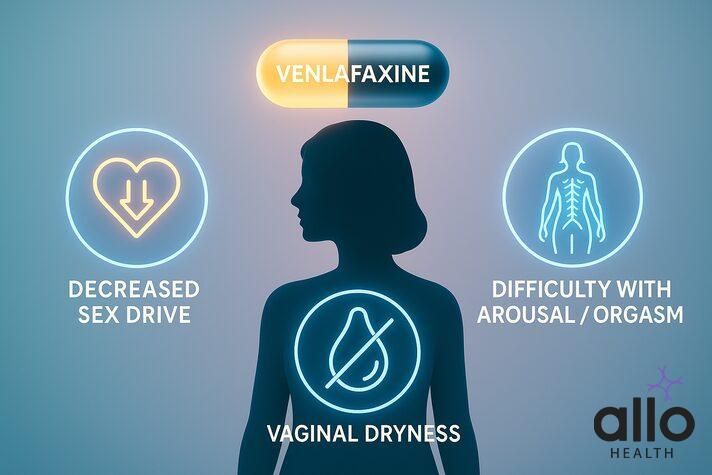
How To Manage Sexual Side Effects Caused By Venlafaxine?
Keep in mind that you shouldn’t stop taking venlafaxine on your own. Stopping venlafaxine suddenly can lead to withdrawal symptoms [6] (antidepressant discontinuation syndrome)
A doctor can help you by:
Adjusting the Dose of Your Antidepressant
Sometimes, lowering the dose of venlafaxine (under a doctor’s guidance) can reduce the risk of sexual side effects.
Adding a Supportive Medication
Medicines like buspirone may help improve sexual side effects when taken along with venlafaxine.
Switching to Other Antidepressants
Your doctor may suggest switching to medications that are less likely to cause sexual problems. Some examples are bupropion, mirtazapine, or the extended-release form of venlafaxine (desvenlafaxine).
Using Medicines That Improve Sexual Function
Drugs like sildenafil (Viagra) for men or flibanserin (Addyi) for women can help improve sexual function.
Cognitive Behavioral Therapy (CBT)
In CBT sessions[7], you discuss situations that are hard for you and how they affect your thoughts, feelings, and actions. This therapy can greatly improve mental health and reduce sexual problems linked to stress or anxiety.
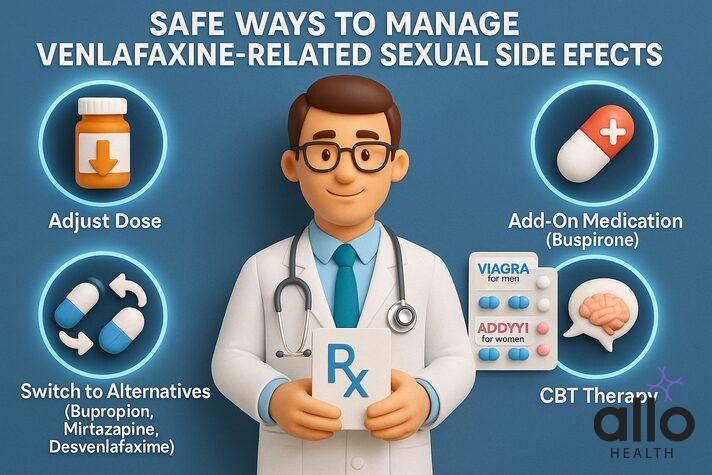
Tips To Cope With Sexual Side Effects Caused By Venlafaxine
Seek Professional Help
Talk to your psychiatrist or sexologist about these sexual side effects. Be open about how they impact your mental health, daily life, or relationships.
Talk To Your Partner
Talking to your partner can help you better understand how these sexual side effects may affect your relationship. Meet with a sexologist to learn what your options are. They can guide you on what steps to take if sexual dysfunction becomes a problem.
Adjust Routines And Expectations
Following a consistent schedule can keep life more predictable and reduce stress as you adjust to the medication. Take medication as prescribed and at the same time each day. Plan your sexual activity at times of the day when sexual side effects are less troubling.
Exercise
Regular exercise like walking, cycling, yoga, or strength training can help. These exercises improve blood circulation, lower stress, and boost testosterone levels.
Get Good Sleep
Fatigue and sleep deprivation can contribute to decreased sex drive and impact sexual function. Lack of sleep has been linked to having a higher risk of erectile dysfunction [8]
Practice relaxation techniques, limit phone time, and remove any other sleep disruptions before bed.
Consider Therapy
Psychotherapy can help you understand the impact of sexual dysfunction on your mental health. Sex therapy may also be helpful to develop strategies to manage sexual side effects. Join self-help groups through different online forums or online psychiatry platforms. These can help to seek answers and assurance.
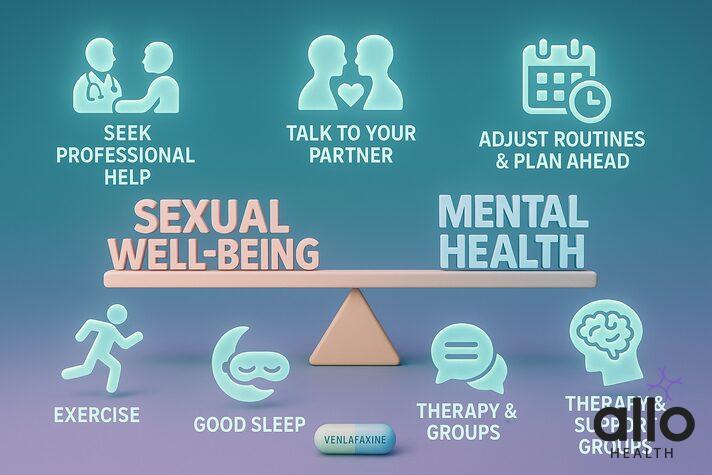
I always tell my patients that their mental health and their sexual health are connected, and they deserve care for both. With the right treatment, my goal is to make sure you feel better in every part of your life.
Conclusion
Venlafaxine remains a highly effective medication for depression and anxiety. But it has the potential to cause sexual side effects, like erectile dysfunction, which can be stressful for patients. Recognizing the cause, early signs, and speaking to your doctor can help diagnose and treat these sexual side effects. The doctor can adjust the dose, switch strategies, or add supportive therapy. By learning new coping techniques, the patient can reduce the impact of these side effects on their everyday life. Open conversations with doctors, partners, and even peer groups can help reduce the stigma. It can also improve the quality of life while staying on track with their mental health treatment.
"The following blog article provides general information and insights on various topics. However, it is important to note that the information presented is not intended as professional advice in any specific field or area. The content of this blog is for general educational and informational purposes only.
Book consultation
The content should not be interpreted as endorsement, recommendation, or guarantee of any product, service, or information mentioned. Readers are solely responsible for the decisions and actions they take based on the information provided in this blog. It is essential to exercise individual judgment, critical thinking, and personal responsibility when applying or implementing any information or suggestions discussed in the blog."


